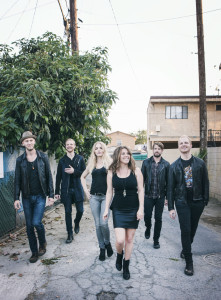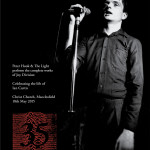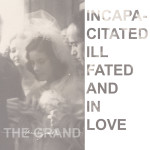Signed by legendary Sire Records boss Seymour Stein after getting off the ground via a Kickstarter campaign, Delta Rae are a six-piece band from North Carolina. Their sound takes the traditional Americana fayre of folk, country and rock and adds a plethora of modern twist, from R&B harmonies and hip-hop beats, operatic vocals and euphoric gospel wells. GIITTV had the privilege of catching the band’s songwriting lynchpins Eric and Ian Hölljes for a few minutes of chat before their debut UK show at the Barfly in Camden, London.
There are three siblings in the band, so we needn’t ask you how you met, but how did the idea of Delta Rae take shape?
Eric: Ian and I have been playing together and writing music since were 10 or 12 years old, so that was really the impetus for the band. When we graduated college we were working out what we wanted to do, and that was in 2008/2009. The markets were crashing, so we thought we’d take a chance on it. So we bought a house in the woods in North Carolina and all the singers moved into it; we kept the costs really low, like a commune really. We had graduated from school. Brittany was living in California and Liz was in New York, so when you’re trying to get people to come down, you want to make things as easy as possible. Although living in one house with your siblings isn’t always the easiest thing in the world, but it made it feasible.
Ian: And the other thing was that it made the music and the band the focus. It’s so easy to get distracted, but that wasn’t really an option.
Who – or what – is Delta Rae?
Ian: We grew up with a really healthy love of music and storytelling. Out mother would try, once a week, to get us all together and read novels, and a lot of those novels would be steeped in mythology, whether it was Narnia or Lord of the Rings or whatever. So we grew up with this love of novels and fantasy, great storytelling and great writing. She always wanted to be a novelist herself and she did publish one book when we were growing up; she had this other idea for a long time, about this girl from the south who reawakens the Greek Gods to save her dad, and this girl’s name was Delta Rae. When we were starting the band, we were really having a tough time coming up with a band name, so we asked if we could use that name because we really liked it. It’s a blend of the south and then something further than that, something epic. It seemed like a natural kind of fit for what we were doing.
You seem to have carried that vibe of storytelling and mythology on when writing this album…
Eric: On this album (After It All), which is the first that’s been internationally released, it was really inspired by our real experiences on the road for the past few years in the states. You can hear it on the record – it’s really taken on a bigger, more epic storytelling quality as we were recording it.
But although you have rural roots, you’ve also tackled themes like urban decay on the album track Bethlehem Steel…
Ian: Bethlehem is in Pennsylvania. It used to be the biggest steel manufacturing town in the world, and now it’s a ghost town.
Eric: Well, it’s not a ghost town. It was a ghost town and now it’s been reborn, but that industry has completely gone.
Ian: We grew up in a family where there was a lot of storytelling and our father actually spent a couple of summers working in steel mills in Baltimore and Maryland. We’re pulling on that kind of family mythology and turning it into things we’ve seen around us on the road, and that’s the thing this record memorialises – that year we spent travelling the American countryside.
What do make of the recent riots in Baltimore?
Ian: Sometimes I think about what it must look like internationally because it’s something we struggle with so much as a country and I feel really stymied by it. It’s such a quagmire, you know? It has all the entrenched complexities, and heartbreaks of the Middle East. How do we solve these intractable problems? There are parts of America where everything is very peaceful. America as a whole is a very successful melting pot and our ideals are very strong, but you see these problems pop up and they do show real systemic issues. It’s something that’s very much on our minds, but, you know, you’ve got all the greatest minds in the world trying to solve these problems, and solutions just aren’t easy.
Do you think musicians can help?
Ian: Our initial inspiration came out of our parents’ record collection, music from the 60s and 70s, where music was a huge impetus for change, with certain social movements. I do feel less and less that music is a catalyst for those kinds of changes. It’s challenging to find out whether people want to look to music for that kind of inspiration in a way. A lot of it is escapism, and I think there’s a place for that, but it would be useful if our music and our entertainment could help us talk about these things and keep us informed about the major issues of the day. The thing about mythology is that it always carries an embedded moral authority. They’re often masked in a disguise, but that’s what makes them more approachable.
What are you looking forward to encountering in the UK?
Eric: I think we’re very curious to play for our first London audience. We’ve heard that their response might be a little different to those back home.
Ian: I’m impressed by a lot of music that comes from these shores: Arctic Monkeys, Florence and the Machine, Adele. The thing that UK artists do so well is tap into a cultural history that really has so much magic to it. There’s such a sense of romance and tradition, and intellectualism about the UK. I feel that a lot of the artists coming right now from the UK and having big success are tapping into that; I don’t think that American artist are doing it quite as successfully.
The folk rock scene can be quite dogmatic and backward looking, but you’re quite experimental, bringing styles like opera and R&B into the mix…
Ian: What is America’s history? It’s the revolutionary spirit. I think that should be part of what makes the sound, you should be breaking new frontiers, and that’s very much what’s of interest to us as a band.
What is Scared, the first single from the album, all about?
Eric: I’ve been in a number of relationships now and it always seems to come to this moment where I get spooked and I get worried about it, and start thinking about the future and if it’s going to work. Can I trust this person? Do I love this person as much as I want to? And you’ve already built something together so then you’re worried about abandoning it. It was a culmination of a lot of things, but it felt like something I’d been going through recently. Ian and I wrote that and it just kind of popped up out of nowhere. We finished it really quickly, and then we did a music video for it, a sort of vivid dramatisation of that sort of story.
Do you both have specific songwriting roles?
Ian: We’ve evolved to the point where we both do a lot of it. It started off that Eric was the musician/arranger and I was writing the words.
Eric: It was coming from me playing piano from the age of 10 while Ian was writing poetry books at seven, so he was bringing a bit of the wordsmith quality. But I think at this point we’re so interested in what the other person has to offer that we’re trying to do both.
And finally, would you say the album has an overall theme?
Ian: I don’t think it has a theme but we talked a lot about the American frontier when we were making it and we wanted it to be a reflection of the landscape that we’d been traversing over the last couple of years. There are parts of America that are just so open and unpopulated, and I think that’s really what you see when you’re on the road. You’ll spend days upon days travelling, from Texas to California or from Salt Lake City to Chicago. You go through vast expanses and you’re reminded how much of the country is still a natural landscape.
Eric: That’s definitely powerful for me, that is part of tapping into the American mythology. That’s something we’re very interested in as a band.
Delta Rae play Liverpool’s Sound City festival on Friday May 22.
After It All is out now on Warner Brothers.





